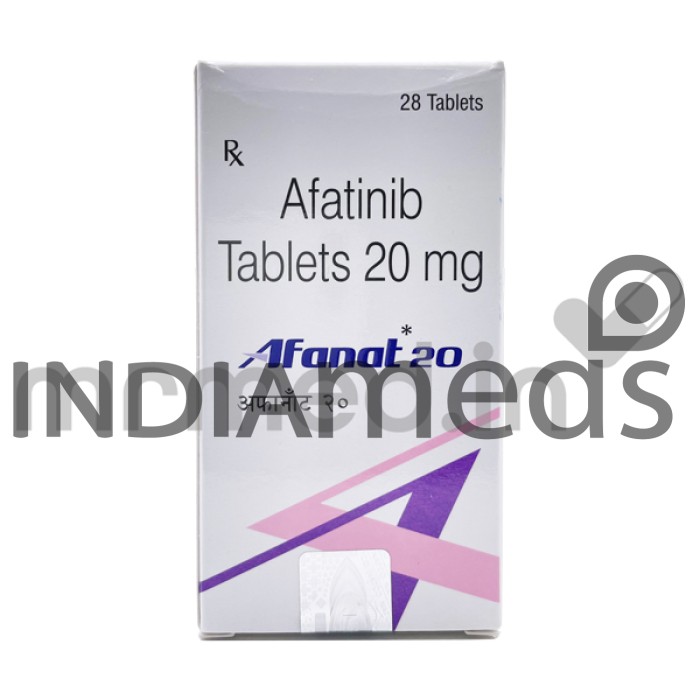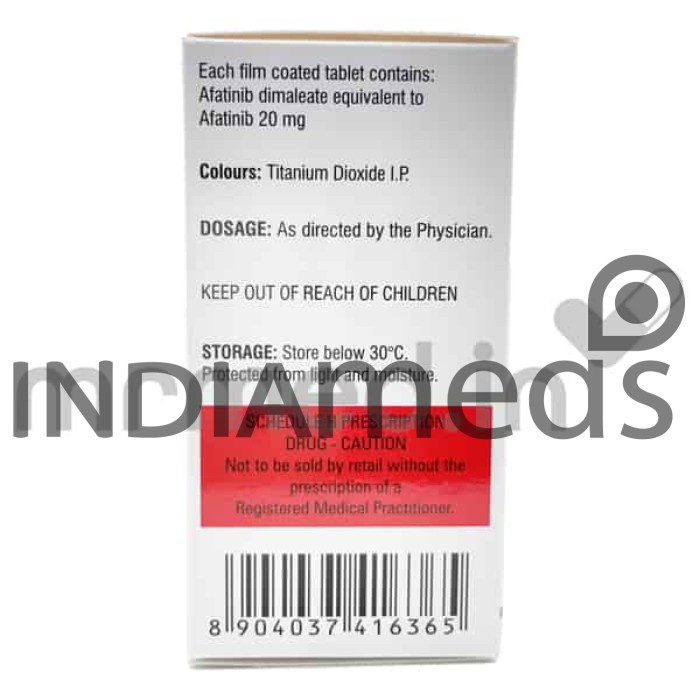Afanat 20mg Tablet is an anticancer medicine containing Afatinib dimaleate as an active ingredient. It is used to treat patients with non-small cell lung cancer (NSCLC) whose tumors have certain (non-resistant) abnormal epidermal growth factor receptor (EGFR) genes and patients with metastatic, squamous NSCLC progressing after platinum-based chemotherapy. Cancer is a disorder in which cells multiply in an abnormal and uncontrolled manner. Talk to your doctor if you have kidney disorders, breathing problems, liver disorders, heart problems, intolerance to sugars, severe dry eye, or other eye problems before taking this medicine.
Afanat 20mg Tablet can delay disease progression and improve overall survival, it can also help patients maintain a better quality of life for a longer period of time. This includes improved physical functioning, reduced pain, and better mental and emotional health. Tell your doctor if you are wearing contact lenses or breastfeeding before taking this medication. Limit your time in the sun as this medicine may make your skin sensitive to the sun. It is not recommended for children and adolescents under the age of 18. Do not stop taking this medicine without consulting your doctor.
- Non-small cell lung cancer (NSCLC)
Therapeutic Effects of Afanat 20mg Tablet
Pregnancy
Afanat 20mg Tablet is unsafe during pregnancy as it can cause fetal harm. It is recommended to avoid this medication during pregnancy.
Breast Feeding
It is unknown, whether Afanat 20mg Tablet is excreted in human milk or not, and the potential risks to a nursing infant are unknown. So nursing women should consult a healthcare provider before taking it.
Lungs
Afanat 20mg Tablet is primarily used to treat non-small cell lung cancer (NSCLC). Patients should consult healthcare providers if they have any other lung disease before taking it.
Liver
Afanat 20mg Tablet is primarily metabolized in the liver, so inform your healthcare provider if you have any liver problems or diseases. This medication may also increase liver enzymes, which can be a sign of liver damage or inflammation. Patients taking this medication require regular blood tests to monitor liver function.
Alcohol
It is recommended to avoid consuming alcohol while taking Afanat 20mg Tablet, as alcohol can increase the risk of certain side effects associated with the medication, such as stomach ulcers or gastrointestinal bleeding.
Driving
Patients receiving Afanat 20mg Tablet should be advised to avoid driving or operating machinery if they experience side effects such as fatigue, dizziness, or blurred vision, impairing a patient's ability to drive or operate machinery safely.
Serious:
- Interstitial lung disease (ILD)
- Severe diarrhea or dehydration
- Liver problems
- Eye problems, such as corneal erosion or ulceration
- Hemorrhage or bleeding problems
- Kidney problems
- Cardiac problems
Common:
- Diarrhea
- Mouth sores
- Acne or skin rash
- Nausea and vomiting
- Fatigue
- Loss of appetite
- Abdominal pain
- Nail changes, such as nail bed infections or inflammation
- Dry skin or itching
- Eye irritation or dryness
- Respiratory infections
Patients should not donate blood while taking Afanat 20mg Tablet, as the medication can be harmful to the recipient. It is important to inform your healthcare provider if you plan to donate blood, as they may advise you to wait until after you have finished treatment.
The ability to work or go to school while taking Afanat 20mg Tablet will depend on your individual condition and response to treatment. Some patients may experience fatigue or other side effects that can impact their ability to perform daily activities.
There is limited information on the effects of Afanat 20mg Tablet on fertility. However, it is important to inform your healthcare provider if you are trying to conceive, as some cancer treatments can affect fertility.
If you have a history of heart problems, it is important to discuss the potential risks and benefits of using Afanat 20mg Tablet with your healthcare provider before starting treatment. This medication can cause cardiac problems, and your healthcare provider may need to monitor you closely during treatment.
Afanat 20mg Tablet is sometimes used in combination with other cancer treatments, such as chemotherapy or immunotherapy. However, the safety and effectiveness of these combinations will depend on your individual condition and treatment plan.






-200x200.jpg)